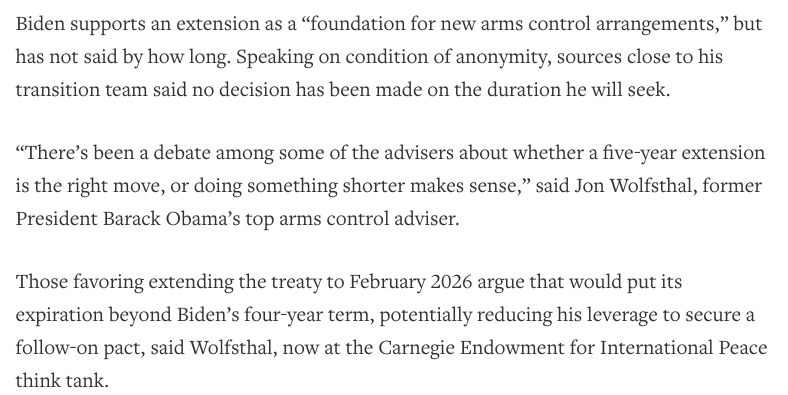Sigh. Here’s why: Gambling with a short-term extension of New START carries far more downside than upside. A full five-year extension is perfectly consistent with–and sets the best table for–pursuing talks on a follow-on agreement.
Long thread. (1/n) https://www.reuters.com/article/usa-biden-armscontrol/biden-urged-to-extend-u-s-russia-arms-treaty-for-full-5-years-without-conditions-idUSKBN2852Y0
Long thread. (1/n) https://www.reuters.com/article/usa-biden-armscontrol/biden-urged-to-extend-u-s-russia-arms-treaty-for-full-5-years-without-conditions-idUSKBN2852Y0
First let’s recall: The Trump admin’s position was that a five-year extension w/o conditions was unacceptable. Why? Cause in that case there would be no incentive for Russia to negotiate on the admin’s desired goal of a more comprehensive deal capturing more weapons/states. (2/n)
Undergirding this position was the administration’s belief that Russia was desperate for an extension of New START, pretty much at all costs. (3/n)
So after 3.5 years of holding out, team Trump ultimately offered – after climbing down from even more maximalist offers – a one-year extension IF Russia agreed to a politically-binding, verifiable freeze on all U.S. and Russian warheads. (4/n)
Did the administration’s offer of a short-term extension provide any leverage? Did it compel Moscow to agree to the U.S. offer? Not exactly. (5/n)
For much of 2020 Russia called for a clean, 5-year extension (though it also said it wld consider a shorter one). In October, Moscow said it wld agree to a one-year extension and a one-year warhead freeze, but apparently w/o any definitions, declaration, or verification. (6/n)
The Russia position was unacceptable to the Trump administration. And there’s little sign either side intends to further negotiate before Inauguration Day. Meaning that the Biden administration will have a mere 16 days to secure an extension. (7/n)
Might Russia have ultimately agreed to the Trump administration’s terms had Trump won the election? Anything’s possible. But it seems unlikely that Russia planned to cave. It turns out that Moscow might not be so desperate for an extension after all. (8/n)
Which brings us to the internal Biden discussion about the duration of an extension. The ONLY reason not to extend for five years is if you think a shorter extension would provide leverage to get Russia to agree to a new deal – or at least begin and stay at talks on one. (9/n)
But the Trump proposal of a one-year extension didn’t force Russia to cave. Nor would one year have been enough time to negotiate the kind of deal the Trump administration was seeking. (10/n)
Could a less ambitious follow-on, say one only focused on further limits on deployed strategic weapons, be negotiated in one year? Maybe. But even New START took ten months to negotiate and that was at a time when the US-Russia relationship was less...tense (11/n)
What about rolling one-year extensions to keep Russia’s feet to the fire? First, there’s no guarantee Russia would agree to more than one extension. Second, the posturing ahead of the extension decisions would distract from the talks on a new agreement. (12/n)
As @Gottemoeller has written re a one-year extension: “The Russians are masters at maneuvering leverage and will ensure that most of the year spent negotiating will be lost in argument over who is responsible for not getting to ‘yes.’” https://www.tandfonline.com/doi/abs/10.1080/0163660X.2020.1813382 (13/n)
A one-year extension would present multiple crisis points, as @atomicbell has put it, each time the treaty is set to lapse again – something that happened with JCPOA before Trump withdrew. https://www.armscontrol.org/events/2020-10/briefing-trumps-effort-sabotage-new-start-risk-out-arms-race (14/n)
Which leaves a possible two-year extension. (Three or four years but not five? Seriously?) Might two years provide Russia with a greater incentive to at least come to the table? Maybe. Might it provide enough time to negotiate a new deal? Maybe. (15/n)
But here’s the thing. Why does a short-term extension have to be the impetus? If Biden and Putin direct their teams to try to find a deal and identify a notional timeline for doing so, that will provide a strong forcing mechanism. (16/n)
Regardless, neither side is going to agree to a new deal just because New START might expire in 2023 instead of 2026. The outcome of the pursuit of a follow-on will succeed or fail based on whether those arrangements address the interests and concerns of both parties. (17/n)
For example, want an impetus more likely to focus the Russian mind than talk of short-term extensions? Try a stated U.S. willingness to put missile defense on the table. (Sacrilegious I know.) (18/n)
Meanwhile, if some Biden advisors are arguing for a shorter-term extension of New START, are they also urging pairing extension with a total warhead freeze a la Trump? https://twitter.com/nukestrat/status/1331936543590723584 (19/n)
Soon to be former Trump administration officials are arguing Biden should be held to that standard. https://www.pbs.org/newshour/show/u-s-russia-close-to-a-deal-on-nuclear-arms-control-says-special-envoy (20/n)
A freeze paired w/an extension could be a useful confidence building measure even w/o verification (though it’s hard to see how to avoid definitions and a declaration). But Biden shouldn’t feel bound to a deal that wasn’t agreed to. (21/n)
Russia only agreed in principle to the concept of a freeze. It does not appear to have agreed to defining warheads or a declaration – and definitely has not agreed to subsequent verification. It’s hard to see how those details could be negotiated in 16 days. (22/n)
In sum, Biden should seek Russia’s agreement on five-year extension and a joint commitment to begin follow-on talks aimed at reducing growing risks to strategic stability, capturing additional weapons, and achieving further mutual reductions. (23/n)
Extending New START by five years would prolong the limits on Russia’s deployed strategic forces, continue an otherwise unobtainable flow of information about those forces, and provide the necessary foundation from which to seek more far-reaching arms control goals. (24/24)

 Read on Twitter
Read on Twitter


